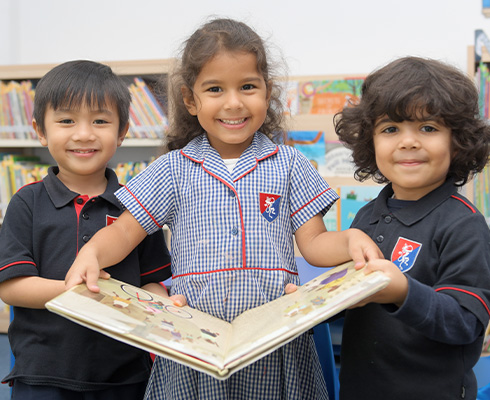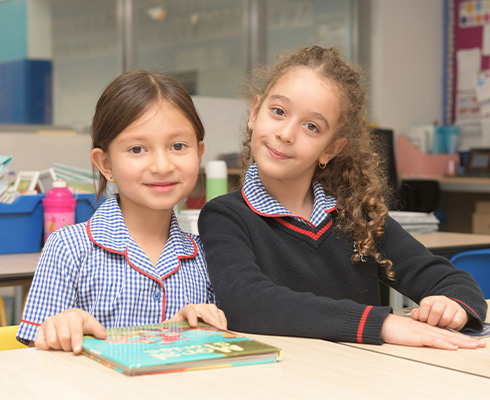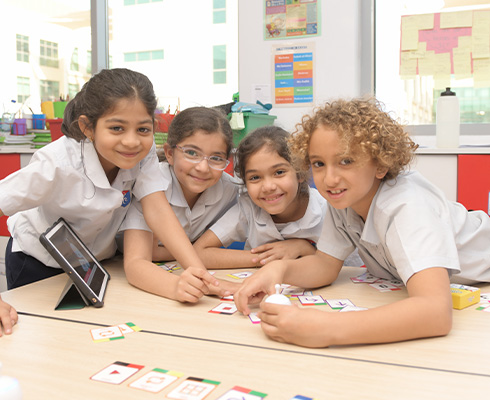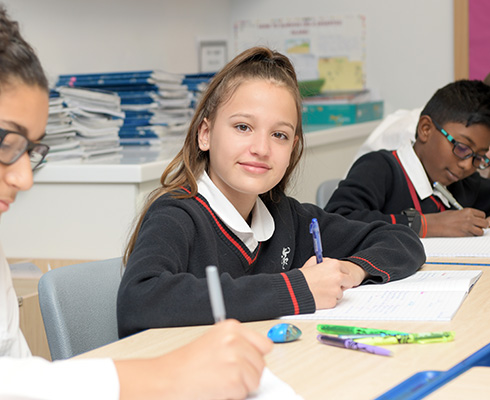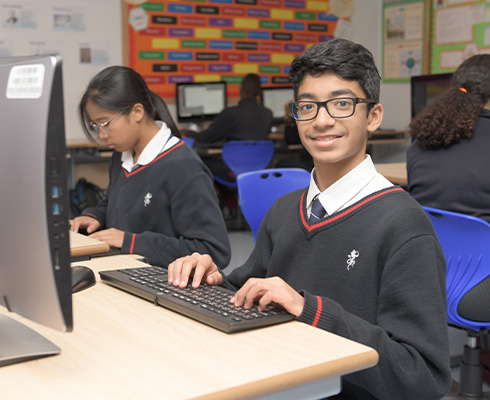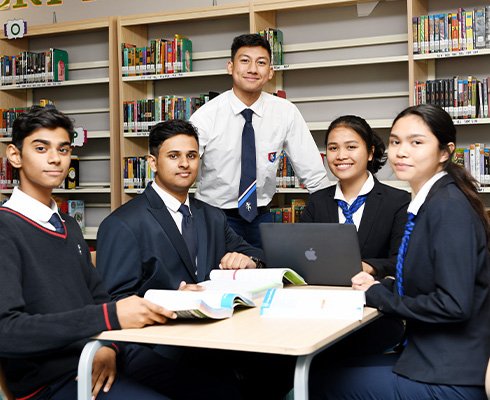Key Stage 2 Curriculum at GFS
Key Stage 2
At GEMS Founders School, Key Stage Two (Years 3 to 6) is a vital stage in every child’s learning journey. It’s a time when independence grows, curiosity deepens and students develop the knowledge, skills and values they will carry into their future. Our curriculum is designed to be broad, balanced and engaging—supporting academic success and personal development in equal measure.
Explore the Key Stage Two Programme
(Age 7 years old to 11 years old)
(Year 3 to Year 6)
-
Pedagogy
In Key Stage Two, pedagogy is underpinned by immersive and purposeful learning experiences that engage, challenge and inspire. Teachers design lessons that build upon prior learning while introducing new concepts in a meaningful and connected way. We aim to make learning memorable by providing real-world experiences that deepen understanding and support long-term retention.
Thematic and experiential learning opportunities are used to enhance engagement, such as themed days (e.g. Mexico Day or Viking Day), art exhibitions or visits beyond the classroom. External educational visits are carefully chosen to complement learning and offer experiences that cannot be replicated within school. These range from exploring scientific forces at amusement parks to understanding environmental conservation at wildlife centres. Our curriculum also reflects and celebrates the culture of the UAE, including trips to local heritage sites to support cultural understanding. Teaching in Key Stage Two is structured and intentional. Lessons follow a clear learning sequence, with opportunities for modelling, guided practice, independent application and retrieval of prior knowledge. Digital technology is embedded across the curriculum to enhance creativity, deepen understanding and allow pupils to express their learning in innovative ways.
Across all subjects, we promote a culture of collaboration, critical thinking and curiosity. Teachers make effective use of questioning and feedback to challenge learners and to identify and close gaps in understanding. Pupils are encouraged to discuss their ideas, reflect on their learning and take increasing responsibility for their progress, supporting the development of confident and independent learners.
-
Curriculum Maps
-
Course Structure
Our curriculum is ambitious for all. Throughout, we are committed to deepening pupils’ curiosity about, understanding of, and respect for, the world around them. Our curriculum is carefully designed taking pupils from what they already know to newly acquired knowledge and skills, with a focus on retention of transferrable knowledge and skills. We ensure coverage and progression in each of our subject areas.
English and Maths are taught daily, while Science, Humanities, Computing, Art, DT, Music, PE, French and Moral Education are delivered weekly through a rich timetable. Each subject is planned to build over time, with progression documents guiding the development of skills and concepts across the phase.
Subjects are not taught in isolation—teachers make deliberate links between disciplines so that children can connect their learning and understand how knowledge fits together.
-
Reading and Writing
It is our ultimate goal that all of our children develop an intrinsic love of reading and become lifelong readers and learners.
Reading is at the heart of Key Stage Two. We build a culture where books are celebrated, and reading is a valued shared experience. Dedicated reading time and sessions in the library gives space for children to enjoy texts, while guided reading lessons ensure that comprehension and fluency are explicitly taught and practised.
Our school also encourages children to subscribe to a reading programme called ‘Bug Club’. Bug Club is an online reading world which provides levelled e-books for the children to practice and reinforce their reading skills at home. Our teachers assign books based on children’s reading levels and monitor their progress and engagement of their reading at home. These books are very interactive and loved by pupils. Interactive activities, characters they know and love, and rewards keep the children motivated. Visiting Bug Club each week and completing the learning activities support the children to become confident and independent readers
We expose children to a wide range of genres, authors, and cultures to help them see reading as a window to the wider world. Class texts inspire writing, build vocabulary, and foster empathy and understanding.
In writing, we teach children to write with purpose, structure and style. Across the key stage, children explore a range of genres including narrative, recount, persuasion, explanation and discussion. They learn to plan, draft, edit and publish their work—and to take pride in their progress. Oracy and drama are embedded across English and wider subjects to support vocabulary and expression.
-
Mathematics
Mathematics is taught using a mastery approach that builds deep understanding and fluency. Lessons focus on small steps and are designed to develop confidence, competence, and flexibility in applying number facts and methods.
We follow the ‘Power Maths’ programme to teach a broad and challenging curriculum which provides many opportunities for children to develop confidence and fluency with whole numbers, counting and place value.
Every lesson starts with a Discover task to get children to solve a problem that aims to generate curiosity. During the Discover section, we maintain a strong emphasis on using practical apparatus, such as concrete objects like counters, bead strings, ten frames, etc. to support the children to gain a deeper conceptual understanding of mathematics and explain their method and their thinking process.
Power Maths also takes the approach “I do, we do, you do’:
I Do - In the first step, the teacher models the appropriate way of performing the skills included in the new concept being taught.
We Do - After the teacher models the correct way to perform the new concept being taught, the class work through some examples together.
You Do - This step is where students demonstrate their initial level of understanding of the new concept being taught through independent practice. This allows for a deeper level of learning to develop.
Children are supported to move from concrete resources to pictorial representations to abstract concepts. Reasoning and problem-solving are integral, with students regularly challenged to explain their thinking and apply skills in unfamiliar contexts.
Our aim is for every child to feel like a mathematician—able to spot patterns, take risks, and enjoy the challenge of solving complex problems. GFS pupils develop the mathematical thinking that underpins success in secondary and beyond.
-
Assessment
Assessment is used thoughtfully to inform teaching and support progress. Teachers use a blend of formative strategies—including questioning, retrieval practice, and feedback—as well as summative assessments at key points across the year.
Children are involved in the assessment process and develop an understanding of their own targets and progress. Data is used at class, year group, and leadership levels to ensure no child is left behind.
At the end of Year 4,5 and 6 children complete GL Progress Tests and our curriculum ensures they are well-prepared for these while maintaining breadth and depth in learning throughout the key stage.
For summative assessments, we do the following:
- Assessed independent writing periodically through the year
- End-of-unit assessments and end-of-term assessments in Maths
- End of unit assessments in Science
- End of term reading assessments
- End-of-term VGPS (vocabulary, grammar, punctuation & spelling) assessments
- GL Progress Tests (Y4 and up)
- CAT4 Tests (Y4 and Y6)
All internal assessment done at GFS is to inform teachers of next steps in lessons. It is vital for teachers to know where the children are in their learning in order for them to plan effectively for the future. We try not to put too much of an emphasis on the assessments so that we avoid the children feeling pressured.
-
Enrichment
Learning in Key Stage Two goes beyond the classroom. Our enrichment programme brings the curriculum to life and provides experiences that broaden horizons, build confidence, and deepen knowledge.
Thematic days such as Roman Day, Viking Day and Mexico Day are carefully designed to immerse students in their topics and make learning unforgettable. Opportunities for performance, presentation, trips, and collaborative projects are integrated throughout the year.
Children also benefit from access to digital tools that support creativity, communication, and collaboration—developing digital citizenship and future-ready skills.
Leadership opportunities in Year 5 and 6, including mentoring younger pupils and representing the school, which help children to develop confidence, responsibility and a strong sense of community.
Our teachers lead Extra-curricular activities throughout the year. ECAs run after the school day and offer a range of enrichment opportunities for the children, including activities such as dance, chess, sports, coding and arts & crafts.





